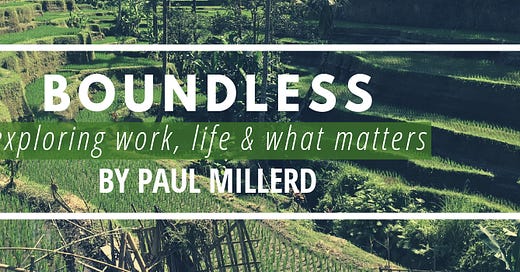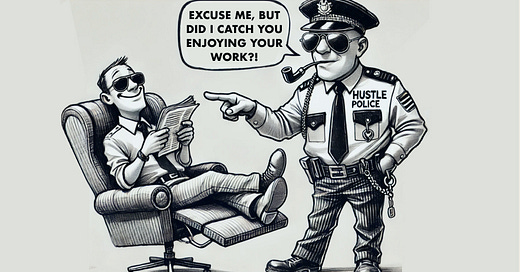Boundless #60: The Truth About Work
Is everything work? | Out of touch Professors | Insights From Range

August 3rd, 2019: Hello from Taichung, Taiwan. Hope you are having a good first week of August. I’m excited for the 2nd digital course I’m running, kicking off this Sunday where I’ll teach people problem solving skills from strategy consulting. If you’re curious you can grab one of the last minute spots here.
#1 What I believe about the future of work
Last week I wrote about an event I held with 16 people carving different paths. I structured the event around six beliefs I hold about the future of work. As I told them, my goal wasn’t for me to get them to adopt my beliefs, but for them to expand their imagination by about 10%. I’ll share them over the coming weeks and will also be using this as a platform to refine content for curious rebels carving their own path (link here to give feedback and get early access - Likely launching September 15th).
Belief #1 I believe that work has fundamentally shifted in ways that are not easily understood
Less than a third of people work in full-time jobs. Even less have jobs with great healthcare, benefits and a path for personal and income growth. Yet our assumptions about the working world are based on a myth of the “organization man” from the 1950s:

I get e-mails and have conversations with people on a weekly basis who “played by the rules.” They got the degrees, credentials and jobs that were supposed to guarantee them everlasting fulfillment. Yet them face misery, anxiety or unexpected failures in their jobs. I’ve shared the anecdote of my successful MBA friend before:
"the new position I was going to accept was then re-orged into oblivion as part of an unrelated org change that wasn't coordinated with the first one - effectively laying me off for a second time in six weeks.”
They tell me, but they don’t tell their friends. They hide it from everyone, sometimes even their spouse. Layoffs, career stagnation and being lost still bring enormous shame as we are operating with broken assumptions.
As Seth Godin says:
The educated, hardworking masses are still doing what they’re told, but they’re no longer getting what they deserve.
For many, they do get what they deserve. At least in the beginning of their careers. For many college graduates, there is a generally traditional path that many follow. It looks something like this:

…but then things get a bit wacky. Many companies still promote a clear career path but struggle to fulfill their promises because of slow growth rates. Many people expect some sort of easy path to a senior Director or executive role. The reality is a bit messier. This means that people’s careers start to look a little more like this:

Navigating a career and more importantly, a life, in the modern world is hard. You used to be able to bank on steady income rises to cover that big mortgage, but how do you bank on that now? The reality is that many people need to learn how to reinvent.
I wish this wasn’t the truth, but as I’ve talked to hundreds of people over the past few years, I’ve realized that the people who have mastered reinvention - dealing with uncertainty, keeping flexible financial obligations and experimenting with new work identities - seem most existed about the future.
So while that senior executive tells you “work hard buddy and you’ll be taken care of one day” look at him and smile, not because you’ll be taken care of but you know something he doesn’t know. That there are no guarantees and that counting on that kind of path is a bit crazy.
Quick quiz: What do the following items have in common?
Data scientist
SEO Manager
Substack Paid Writer
Chief Happiness Officer
Blockchain Developer
Remote Fitness Instructor
Online Course Designer
These are all jobs that barely existed when I graduated in 2007. Now, there are literally hundreds of thousands of people doing these jobs around the world.
How would I have planned for that? In one of my consulting gigs last year I had to rely on my website building skills which I first taught myself for fun when I was about 10 years old. I certainly didn’t plan that - I was just lucky I could help.

I asked the group and I ask you:
We are carrying enormous baggage about how our career is supposed to be. What is your baggage? How is it shaping your behavior? Are there things you can stop believing in?
#2 Is everything work?
From The Guardian:
But the general enthusiasm for describing things as work is more widespread. Marriage, we’re endlessly informed by relationship gurus and divorcing celebrities, is work. Parenting is “the hardest job in the world”. Even leisure has been remade in the image of work, as we strive to reach 10,000 daily steps on our wearable fitness monitors; or check off experience after experience on “bucket lists” – a form of to-do list you’re not even permitted the pleasure of moaning about, because they’re meant to be fun.
Expanding the scope of work is a way to shed light on all of the different types of work people do, the emotional labor, shadow work, interpretive labor and caring labor, as a way to broaden the imagination about how a society operates. However, there is a danger that we begin to look at everything as something with an implicit monetary value and a process to be managed.
Do you look at a relationship as “work”? Is this helpful for you? Hit me up, I’m curious…
#3 Is this really equality of opportunity?
This was from a widely shared article on inequality this week. This professor, who graduated from Middlebury, Yale and Princeton seems to think that a 3rd grader who does not have violin lessons is “behind.”

I think professor Oyer is mixing up middle class family and upper class family. Perhaps he’s never met a middle class person?
#4 Book Corner: Range
I’m reading Range by David Epstein which has a lot of great stories about people that didn’t follow a path of specialization. His argument is that while focusing early and staying on one path can be effective, being a generalist can be better in the long run.
Here is the challenge he outlines:
The challenge we all face is how to maintain the benefits of breadth, diverse experience, interdisciplinary thinking, and delayed concentration in a world that increasingly incentivizes, even demands, hyperspecialization.
Some quotes I highlighted:
On improvising and self-criticism:
Limb saw that brain areas associated with focused attention, inhibition, and self-censoring turned down when the musicians were creating. “It’s almost as if the brain turned off its own ability to criticize itself,” he told National Geographic. While improvising, musicians do pretty much the opposite of consciously identifying errors and stopping to correct them.
On how effective learning strategies involve taking a short-term backward step
In 2007, the U.S. Department of Education published a report by six scientists and an accomplished teacher who were asked to identify learning strategies that truly have scientific backing. Spacing, testing, and using making-connections questions were on the extremely short list. All three impair performance in the short term.
This quote from Olympic figure skater Sasha Cohen was powerful:
“Yes, striving to accomplish a single overarching goal every day means you have grit, determination and resilience. But the ability to pull yourself together mentally and physically in competition is different from the new challenges that await you. So after you retire, travel, write a poem, try to start your own business, stay out a little too late, devote time to something that doesn’t have a clear end goal.”
Wander a little my friends…
#5 Misc 🎊
Join 17 other students in the live cohort of my Think Like A Strategy Consultant course, kicking off August 5th. Join here. Here is what you’ll learn:

I moved my Boundless Reads newsletter over to substack as well. Follow along here.
🔥 Take The Three-Week Self-Employment Challenge over at BoundlessU
Want to support my journey? ✌ You can join the 30+ supporters on my site, on patreon or become a subscriber at the top










